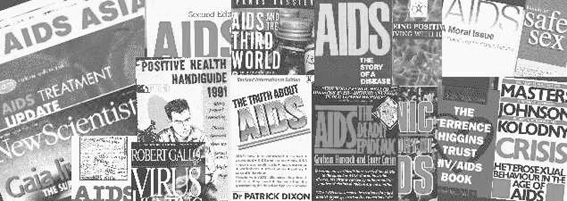Volume 1 (1999/2000)
Issue
1 (March 1999)
Issue
2 (Nov. 1999)
Issue 3 (Dec. 1999)
Issue 4 (Feb. 2000)
Issue 5 (March 2000)
Issue 6 (April 2000)
Issue
7 (May 2000)
Volume 2 (2000/2001)
Issue 1 (Sept. 2000)
Issue 2 (Oct. 2000)
Issue 3 (Jan. 2001)
Issue 4 (March 2001)
Issue 5 (April 2001)
Issue 6 (May 2001)
Volume 3 (2001)
Issue 1 (Sept. 2001)
Issue 2 (Nov. 2001)
Categories
Sport: 1
2 3
Lifestyles: 1 2
3
Commentary: 1 2
3
Review: 1 2
3
Writing: 1 2
3
Event: 1 2
3
And the Band Played On
Catherine Howard
Regina Mundi, Cork
Book Review
And the Band Played On by Randy Shilts

And The Band Played On is a magnificent, enthralling, in-depth
chronology of the mass ignorance and paradoxically, the hysteria which
ended up costing millions of lives during the first decade of AIDS in
our world. Shilts does little to sugarcoat what was possibly humanity's
darkest hour and by the end of the first paragraph the sadness is already
overwhelming.
The book opens on America's 200th birthday (July 4th, 1976) in New York
harbour, where ships from fifty-five different nations were berthed and
the crowds were counted in millions. Shilts constructs a picture of the
greatest party on earth, everyone's objective is to stay out all night,
have lots of fun and to not have a care in the world. But the next paragraph
reads, "This was the part epidemiologists would later note, when
they stayed up late at night and the conversation drifted towards where
it had started and when. They would remember that glorious night in New
York, all those sailors, and recall: from all over the world they came
to New York". In his first page, he highlightes an omnipresent undertone
which those, in their fear and ignorance persisted in screaming - that
AIDS was a punishment for those who led fast-lane lives of sin and why
bother doing anything to stop it, the world would be better off with less
of them. While the homophobes were busy distributing gloves and masks
to firemen and refusing to use CPR dummies in first aid classes, they
forgot that inside we're all the same and the loss of any member of the
human race should be mourned.
Unlike other books on AIDS, Shilts goes deeper into the lives of those
first victims, gay men. After achieving so much they now had to deal with
a bigger, more lethal, hurdle. But their fighting was in vain - AIDS hit
homosexuals first only by pure coincidence, it would be two years before
Haitians, Africans, haemophiliacs and non-risk heterosexuals began dying
of AIDS. Suddenly, upper-class, respected, powerful people were at risk
and millions of dollars of emergency funds began pouring into frivolous
AIDS research. Shilts tells of the politics, too complex to even touch
on here, that paid no attention and gave no help. He exposes the lies
that were carefully constructed to make the government look good. The
National Institute of Health (NIH) Maryland did everything but help save
lives in those first few years. Grants were promised but never distributed
and the joke was that NIH actually stood for Not Interested in Homosexuals.
Then the politicians were pressurised and suddenly the NIH had spent $26
million (out of a budget of $3.85 billion) on AIDS research. However,
it emerged that this money had in fact been spent on studies into the
common cold, uncommon types of skin cancer and fungal infections. Because
AIDS patients had remote chances of contracting them, it was all dubbed
AIDS research. The Centre For Disease Control (CDC) received no funding
in the beginning, even though it was their staff that identified the virus.
At the CDC, Dr. Don Francis submitted countless funding applications but
received no replies - at a time when the virus was at its height he was
even refused $150 for a textbook.
In September 1982 Bill Kraus, a leading gay politician, reported startling
facts relating to funding at the NIH. Shilts writes, that in his report
"National Institutes of Health's research on Legionnaires Disease
amounted to $34,841 per death. By contrast, the health institute had spent
about $3,225 per death" for AIDS. Moreover, while thousands of people
had to die of AIDS before action was taken, Legionnaires took top priority
when 10 deaths and 50-odd infections occurred - the life of a gay man
was worth about one quarter that of a member of the American Legion.
Five words sum up the majority's response to AIDS, and Shilts uses them
for his title - and the band played on. It is an achievement just to collect
and compile reams of detailed information but, he presents it with such
emotion and conviction. He doesn't overshadow the main theme - the sadness,
the loss. One man knew 21 close friends who had succumbed to AIDS. Twenty-one
people. Imagine. Ten million people of every sex, age, nationality and
social preference have had their bodies ravaged by AIDS.
And The Band Played On is the definitive AIDS chronology and, although
complicated, a highly recommended read.